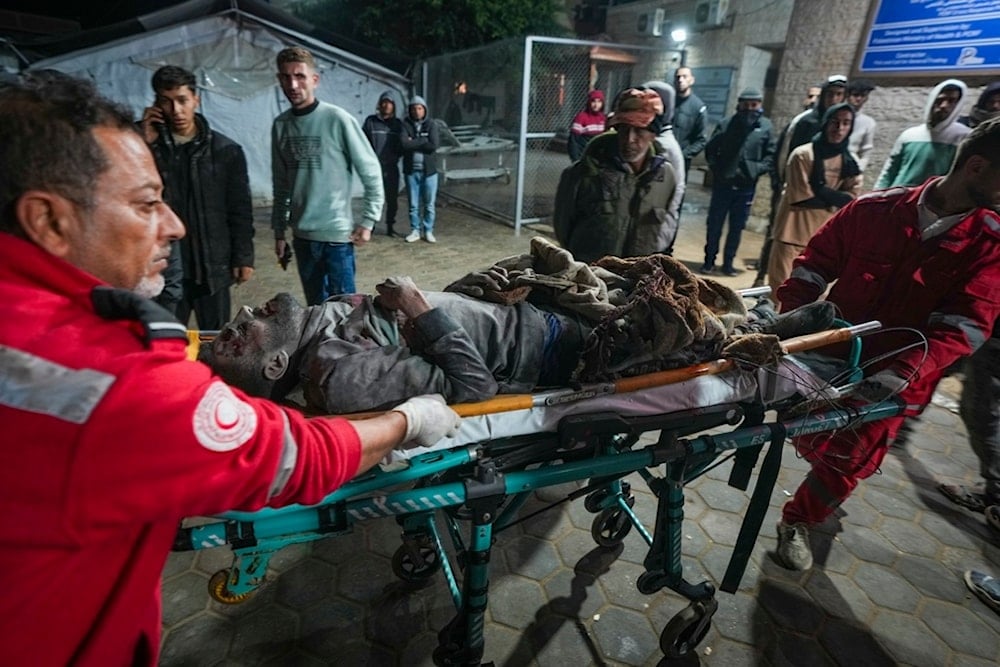UN rights chief tells UNSC Gaza a 'human rights catastrophe'
The UN High Commissioner for Human Rights underlines that the Israeli occupation's actions in Gaza are in violation of human rights
-

A wounded man is brought to al-Aqsa Martyrs Hospital following Israeli army airstrikes in the Nuseirat and Maghazi camps, in the central Gaza Strip, Thursday, on January 2, 2025. (AP)
The UN High Commissioner for Human Rights, Volker Turk, has raised grave concerns about the Israeli occupation's ongoing attacks on healthcare facilities in the Gaza Strip, calling the situation a "human rights catastrophe."
Speaking at a UN Security Council meeting on the Middle East, Turk highlighted the devastating impact of the Israeli aggression, which has killed tens of thousands, displaced countless others, and destroyed critical infrastructure in Gaza.
"The destruction of hospitals across Gaza goes beyond depriving Palestinians of their right to access adequate health care. Those hospitals provided sanctuary for thousands of people with nowhere else to go," Turk said, emphasizing the dire humanitarian consequences of the strikes.
Turk warned that the military operations, especially in and around hospitals, have compounded the suffering of a population already facing massive displacement and dire healthcare needs. He urged independent investigations into Israeli attacks on hospitals and medical personnel, stressing the importance of accountability for violations of international humanitarian and human rights laws.
"I once more warn in the strongest terms about the risk of atrocity crimes being committed in the occupied Palestinian territory," he added, calling on all parties to prioritize civilian protection and facilitate humanitarian aid access.
Turk reiterated his appeal for the Israeli occupation to end its prolonged presence in the occupied Palestinian territory, stressing the urgent need to ensure adequate health care and humanitarian assistance for Palestinians.
Health system under unprecedented strain
Richard Peeperkorn, the World Health Organization’s (WHO) representative for the West Bank and Gaza, also addressed the Security Council, lamenting the repeated targeting of hospitals, which he described as "battlegrounds."
"Time and again, hospitals have become battlegrounds, rendering them out of service and depriving those in need of lifesaving care," Peeperkorn said.
Since October 2023, the WHO has issued repeated calls to protect health workers and facilities in line with international humanitarian law, but attacks have persisted.
Peeperkorn highlighted the worsening health and humanitarian crisis in North Gaza, noting that Kamal Adwan Hospital, a critical facility, was forced out of service due to continuous raids and attacks. Al-Awda Hospital, the last minimally functional hospital in the area, faces severe shortages of food, water, and fuel while operating amid ongoing hostilities.
"Despite incomprehensible challenges, the health system of Gaza has not collapsed," Peeperkorn remarked, commending the resilience of health workers in the face of relentless adversity.
The UN and WHO officials called for urgent action to prevent further deterioration of the humanitarian crisis in Gaza and ensure accountability for violations of international law.
Sharp population drop
Palestinian officials estimate that the population of the Gaza Strip has decreased by six percent over the past 15 months due to the genocide in Gaza. This decline is attributed to more than 200,000 people either being displaced, killed, or injured by the occupation forces.
According to the Palestinian Central Bureau of Statistics (PCBS), the population of Gaza is now estimated at 2.1 million, down by at least 160,000 from the population before October 7, 2023. Additionally, the number of martyrs is estimated at more than 45,000 people, including 17,500 children.
Moreover, 11,000 Palestinians were missing and presumed dead, while at least 100,000 people had been displaced from the besieged area. Another 107,000 Palestinians have been injured in Israeli attacks, according to Gaza officials.
The population decline, which averaged nearly a full percentage point every 10 weeks, is a horrific display of "Israel’s" genocidal brutality – which has also included the destruction of Gaza’s infrastructure, economy, and prospects.
Experts argue that these estimates are likely conservative, as officials often fail to account for all casualties resulting from attacks. They primarily rely on death tolls from strikes reported by hospitals, while other deaths, such as those caused by starvation and disease, are largely excluded from the count.

 4 Min Read
4 Min Read








